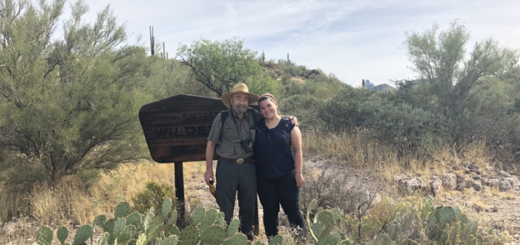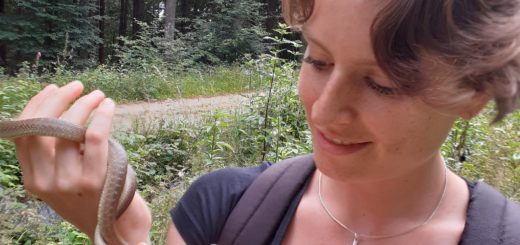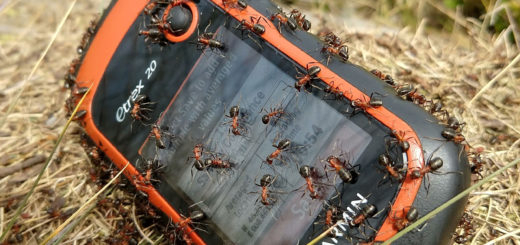Doing an ant PhD: Sanja M. Hakala

Sanja M. Hakala © Jack Beresford
Sanja Maria Hakala is a 31-year old evolutionary biologist from Finland. She has done all her studies at the University of Helsinki, and in addition to biology, she has studied science communication and information science. She has two kids that were born before she started working on her PhD thesis. In this interview, she answered us some questions about her PhD.
An Interview compiled by Patrick Krapf 
MNB: What is the topic of your PhD thesis?
SMH: I study how social organization affects dispersal in Formica ants, looking at different aspects of dispersal from physiology to behavior and population genetics.
MNB: In which year of your PhD studies are you now?
SMH: I just started my final year of PhD studies.
MNB: Why ants?
SMH: I enjoy complicated evolutionary questions, and ants offer plenty of those.
MNB: How do you feel about field work?
SMH: I genuinely love field work, even at 5 am.
MNB: … about identifying ants using a key?
SMH: I know my limits and prefer to let someone more talented do that.
MNB: … working in the wet lab?
SMH: I am happy with lab work. It’s very satisfying to design a protocol and see it work out.

(© Sanja M. Hakala)
MNB: Have you been involved in any of the -omics approaches, and what was your experience?
SMH: I have stayed out of those fields for now.
MNB: Did you acquire your statistics knowledge in university courses, from your supervisor, or on your own?
SMH: In courses and on my own.
MNB: What is the ideal frequency of meeting your supervisor for discussing your research from your point of view: daily, weekly, monthly?
SMH: Weekly.
MNB: Do you like discussing ideas or problems with fellow PhD students?
SMH: I do, very much.
MNB: How many papers do you read in an average week?
SMH: I aim to read at least a paper a day thoroughly. At the moment, I am mostly writing and read a lot more, during field work there is less time.
MNB: In an ideal world, is the working group you belong to small or large?
SMH: Large offers more possibilities – you can still work alone sometimes, but also easily plan bigger things together.
MNB: And ideally, is your uni close to your field-work site or in an urban area?
SMH: Close to field would be a dream.

In the field. © Tanya Troitsky
MNB: Have you profited more from attending conferences with narrower or with broader scope?
SMH: I prefer broader scope, I find it more useful for getting new ideas.
MNB: What is most relevant to you at a conference: attending talks, giving a talk, meeting senior scientists, meeting other students?
SMH: Meeting other people, regardless of their academic level.
MNB: Did you ever participate in a science slam, and if so, would you do it again?
SMH: I did, and it was a wonderful experience! I would be happy to do it again.
MNB: If you would get 100,000 Dollar to spend for your research project, what would you do with it?
SMH: I would hire people to work with me and plan a large-scale behavioral experiment.
MNB: What helps you best in your spare time to relax from work?
SMH: Reading science fiction and spending time outside.

Formica pratensis male. © Sanja M. Hakala
MNB: How do you celebrate successes like getting a paper accepted, a proposal granted, or the like?
SMH: Sharing lots of sparkling wine with colleagues/friends.
MNB: What is the one thing you would do differently when starting your PhD thesis again?
SMH: I would spend even more time reading the literature before starting anything practical.
MNB: Would you like to stay in science?
SMH: I would.
MNB: If you will be supervising PhD students yourself one day, what will be the most important thing you will expect from your students?
SMH: Thinking and discussing.
MNB: … and what will be the most important thing you will want to take care of in supervising?
SMH: I want to know my students so that I am able to give them the kind of support they need. I want to help them learn how they work best, even if it is different from my way.
MNB: What is your personal trick to get over periods of low(er) motivation?
SMH: Attending a conference or reading popular science books. Low motivation arises from forgetting how cool science is, and these things help me remember.

Transmission electron microscopy picture of an ant flight muscle. It shows mitochondria and myofibrills (© Sanja M. Hakala)
MNB: Original article or review article?
SMH: Review article. Condensed information is great.
MNB: Reading or writing?
SMH: Writing is the best part.
MNB: Writing or reviewing?
SMH: Still writing.
MNB: Table or figure?
SMH: Figure. Easier to understand, more fun to make.
MNB: Web of Science or Google Scholar?
SMH: Web of Science, although Google Scholar is getting better and better. Both.
MNB: Windows, OS, or Linux?
SMH: Windows.
MNB: Command-line or graphical-user interface?
SMH: Graphical.
MNB: Mouse or touchpad?
SMH: Mouse.
MNB: Facebook or Twitter?
SMH: Twitter (@SanjaHakala)
MNB: Bus or bike?
SMH: Bike.
MNB: Sun or rain?
SMH: Sun.
MNB: Diploid or haploid?
SMH: I have no preference, and I find it cool that both exist.
MNB: Sting or acid?
SMH: Acid. Formic acid smells like spring to me.
MNB: Social parasite or host?
SMH: Parasite.
MNB: Your favourite ant?
SMH: Shining guest ant (Formicoxenus nitidulus). I’m especially intrigued by their males.
MNB: Thank you so much for this nice interview.





Recent Comments